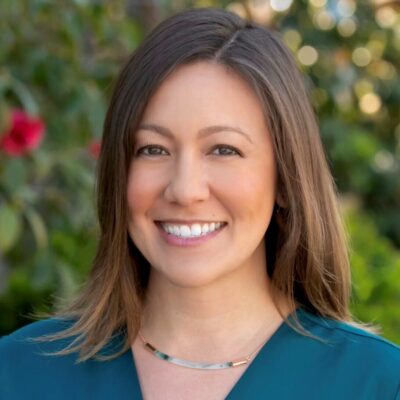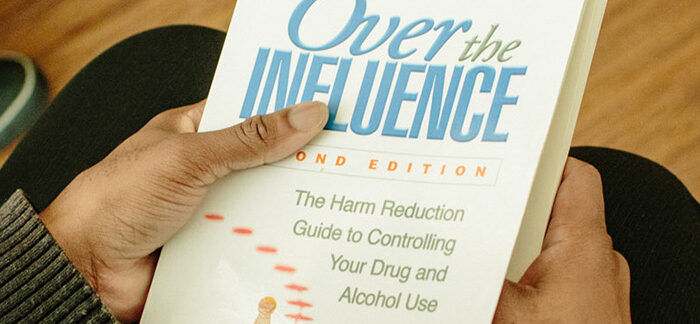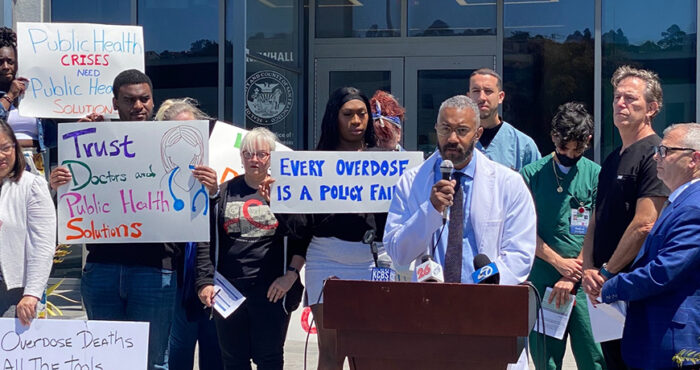Every day, we lose on average two San Franciscans to unintentional drug overdose. We are in the midst of an overdose crisis that has only intensified during the COVID-19 pandemic. With lives of loved ones who use drugs on the line, San Francisco AIDS Foundation staff continue to send an urgent message about how overdose prevention and support for people who use drugs must be prioritized.
“Bluntly, this is a matter of life and death,” said John Halifax, a member of the Syringe Access Services team. “That’s how we frame where we are at this moment.”
“We locked down the whole city for COVID-19, but we’ve had more people die from drug overdoses in the last year. Why are we not treating overdose as a public health emergency?,” said Kyle Temple, senior director of the Stonewall Project. “We need to let people know that people are dying. It doesn’t have to be this way.”
In San Francisco, overdose claimed the lives of more than 700 people in 2020–twice the number of people who died from COVID-19 in the same time frame, and nearly triple the number of people who died from overdose in 2017. In the U.S. the CDC estimates that more than 93,000 people died from drug overdose in 2020.
SFAF provides a variety of services to people who use drugs to help prevent overdose. Staff distribute nasal and intramuscular Narcan (naloxone), a medication that can prevent overdose, at all sites, including mobile syringe access sites, at outreach locations, and through the syringe Pick Up Crew.
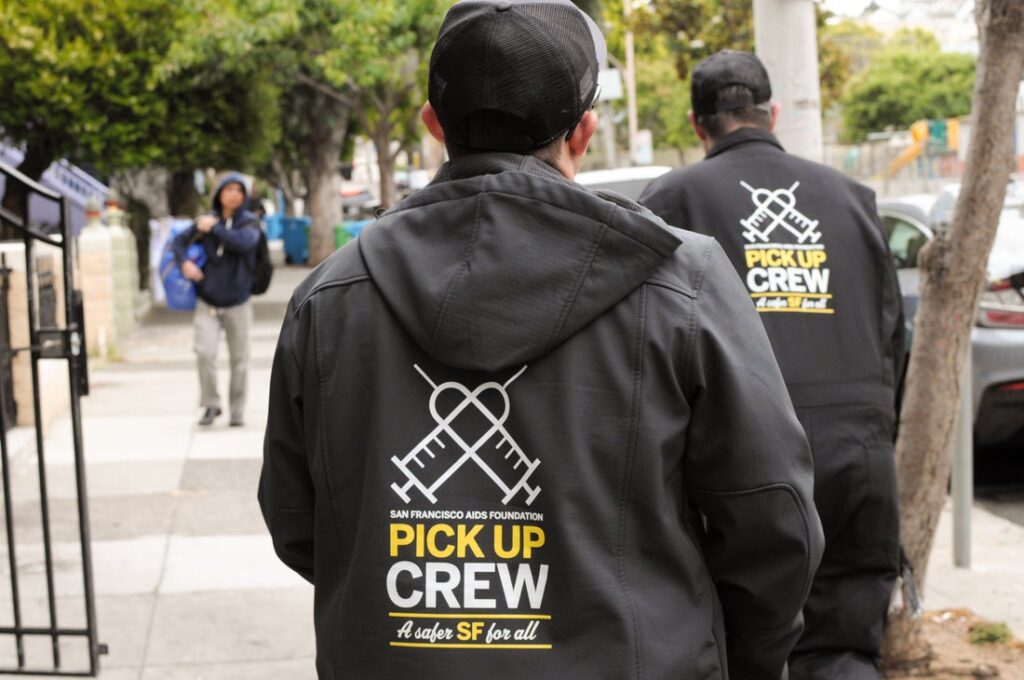
Team members with Syringe Access Services, the Pick Up Crew, and the Stonewall Project regularly engage community members in overdose prevention education and training, so that folks are empowered with strategies that can prevent overdose (e.g., “do a test shot,” and, “don’t use alone”), and are prepared to respond in the case of an overdose.
Because unintentional fentanyl consumption can cause overdose, staff distribute fentanyl test strips, which can detect fentanyl in drug supplies. They also offer training on how to use the test strips, and how they can be appropriately used (fentanyl test strips don’t work with all drugs).
“The biggest thing about harm reduction, or what I try to do with clients, is just reiterate that knowledge is power,” said Lila Zimmerman, a counselor with the Stonewall Project. “Knowing as much as possible about the drugs that you’re using, and how you’re using them, can be really helpful. A lot of people might not realize that even if you’re a recreational user, overdose can absolutely happen.”
Last year, Syringe Access Services distributed 36,710 doses of naloxone, and nearly 4,000 overdose reversals were reported.
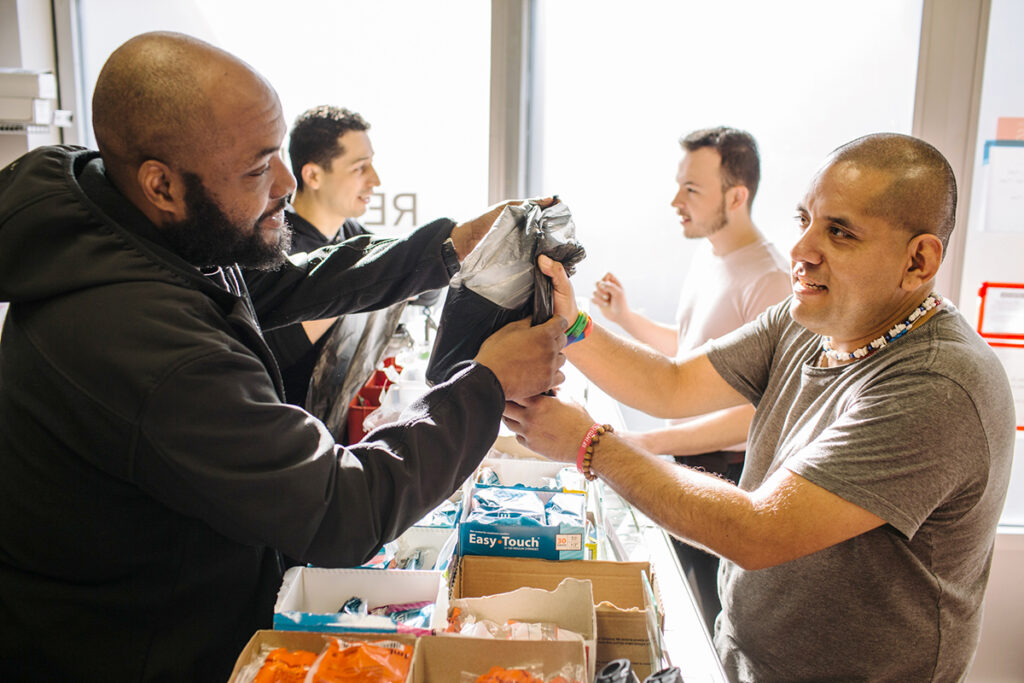
But there is still so much more that must be done in San Francisco to stop fatal overdose, say SFAF staff.
“We have to continue to reduce the stigma around substance use, so that people aren’t hiding their use or using alone–both things that can lead to overdose,” said Andrew Reynolds, manager of HCV wellness. “There are also other big ideas that could help California reduce overdose: things like decriminalizing drugs and of course opening safe consumption spaces.”
Many are hoping to see safe consumption sites established in San Francisco, even as they realize these will not be a magic “silver bullet” in terms of overdose prevention. A state bill (SB 57), which would allow San Francisco to pilot these services, was recently delayed until January 2022 for political reasons.
“Delays in establishing safe consumption sites will cost lives,” said Laura Thomas, director of harm reduction policy. “Overdose is a public health emergency, and must be addressed as one.”
Stigma surrounding drug use contributes to delays and apathy in addressing the overdose crisis.
“Unfortunately, I’m not surprised by policy decisions–or lack of action/decisions–that harm people who use drugs,” said Giuliano. “I’m never surprised at how much people hate people who use drugs, and don’t think their lives are as important as others.”
“We need to stop looking at people with substance use issues as people that are sick, beyond help, or not worthy of respect and compassion,” said Temple. “We need to stop punishing people for substance use, and we need to start wrapping our arms around them–giving them support and services that don’t further stigmatize or push them into isolation.”
This month, SFAF policy, advocacy, and harm reduction staff are urging SFAF supporters and community members to get involved in overdose awareness and prevention.
Get involved! Sign the petition to bring safe consumption services to San Francisco
We can’t wait to take bold action to save lives from overdose. Sign the petition, and urge San Francisco legislators to move forward with opening safe consumption services in San Francisco.
Sign it






